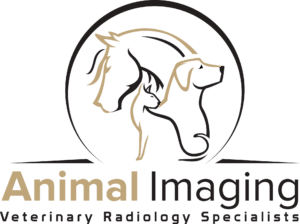Fluoroscopy is a continuous series of x-ray images that allow our board-certified radiologists to see images of the inside of the body in motion to obtain a real-time evaluation. This diagnostic exam is often used to evaluate fluctuations of the trachea (wind-pipe) on inhalation and exhalation or how your pet’s esophagus may dilate or contract with the addition of food.
Common reasons for a Fluoroscopy
- Abnormalities in the trachea and esophagus
- Collapsing trachea
What to Expect with a Fluoroscopy Esophagram Evaluation
Your pet’s esophagus will be evaluated in three different phases.
- The first phase involves your pet swallowing a small amount of liquid barium (a contrast agent) and using the fluoroscopy to follow that fluid from your pet’s mouth all the way to the stomach. This allows our board-certified radiologists to evaluate for abnormalities such as strictures, expansions, or other abnormalities while your pet is actively swallowing.
- The first phase procedure is repeated with barium mixed with canned food.
- The first phase procedure is repeated with barium mixed with dry kibble.
Each phase offers more information regarding the possible esophageal abnormality. The procedure does not involve any sedation or general anesthesia and can be performed while you wait.
What to Expect with a Collapsing Trachea Fluoroscopy
During the procedure, our radiologist will evaluate your pet’s trachea with fluoroscopy when breathing normally as well as when your pet is coughing. The procedure is performed without any sedation or general anesthesia and can be performed while you wait. It is important to not administer any cough suppressants prior to the exam as we need your pet to cough to obtain an accurate study. In severe cases when cough suppressants are absolutely necessary, please contact our office to inquire about special instructions for your pet.
Following a fluoroscopy examination, one of our board-certified radiologists will review all the images and submit a final report within 24-48 hours of the exam. The report and clinical findings will then be sent to the referring veterinarian. Clients should follow up with the referring veterinarian for explanation of results and information on treatment or management.
We are here to help.
At Animal Imaging, our passion is providing the best care and information to you and your veterinarian.
We are proud to have a dedicated team of board-certified veterinary radiologists available for your pet.
Questions or concerns? Call us!
(972) 869-2180
BE IN THE KNOW
Enter your email to be the first to hear about the latest case studies, announcements, and upcoming exclusive CE events.
